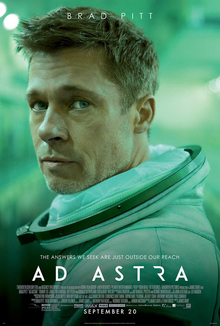This is a film that purports to be science-fiction but is probably best described as psychological horror. It looks reasonably realistic and features some well thought out details of how a near future in which space travel within the Solar System is commonplace might play out. However it plays fast and loose with scientific facts which seriously impacts some major points of its plot. Still it is beautiful and works very well as a very personal mood piece.
Mysterious power surges disrupt life and cause accidents through the Solar System and US Space Command sends Major Roy McBride to deal with it. SpaceCom believes that the cause is the Lima Project, a space station sent 29 years earlier to search for extraterrestrial life from the orbit of Neptune. McBride’s father led that mission and is considered a hero for being a pioneer of space exploration. Roy is therefore given the mission of going to Mars to try to reestablish contact with the Lima station. Roy first goes to the Moon in the company of a friend of his father Colonel Pruitt but they run into trouble as control of the surface of the Moon is disputed and they are attacked by pirates. As Pruitt is forced to stay behind, he reveals that in the event that contact is unable to be established, the Lima station must be destroyed. When Roy finally arrives on Mars, he further learns that his father’s service record is a lie and that he is not the hero SpaceCom makes him out to be.
Watching this film was a frustrating experience for me. On the one hand, it’s a slow-moving film that evokes an introspective mood, in line with the main character’s talent for remaining calm in the face of extreme pressure and SpaceCom’s requirement that astronauts periodically self-assess their psychological state. Also great is how it presents space travel as a common place, every day part of life, with many similarities with commercial air travel and employing technology that we can recognize and feels grounded in our reality. On the other hand, it is jaw-droppingly cavalier about scientific fact when the plot calls for it. For example, just what are the power surges anyway? Why not just call them electromagnetic pulses like everyone else? How could it possibly be economical to pirate resources using rovers on the Moon? If you need to blow up a distant space station, why send a human with a nuclear bomb instead of just a nuclear missile? How is a station in orbit of Neptune supposed to search for traces of life in the rest of the universe? Plus of course, the clincher is riding a nuclear explosion to get back to Earth. It’s mind-boggling that a film that is so thoughtfully constructed in so many ways can be so insouciant about basic facts of science and worldbuilding.
If you can look away from these egregious errors, it is true that there are some things to like. The quiet majesty of space is the perfect setting for Roy’s impenetrable calm. The automated self-assessments and how the walls of the private quarters on Mars are screens showing nature scenes of Earth demonstrate the importance of taking care of the crew’s psychological state. I’m also fascinated that in the end it seems to me that SpaceCom was in the right all along though I’m not sure that director James Gray realizes it. Roy went to see his father for his own personal reasons and there is nothing to suggest that the mission wouldn’t have succeeded without him, so he got all those other crew members killed for nothing. Judging from the tone of the film however, I believe that the director didn’t really think this through. I believe that the silly moon rover combat sequence was included just because he felt that he needed some action, he had Roy save the crew during the flight to Mars to take away some of the sting from what he does later, and he had no payoff to offer in the end except that Roy should learn to connect with other people better.
Reading through past comments on this film on Broken Forum, I would agree that the best assessment is that this is what happens when a director wants to make a slow, thoughtful film but doesn’t have the confidence that the audience will be intelligent and patient enough to appreciate it. Hence the voiceovers to tell you exactly what Roy is feeling every step of the way and the action scenes to make sure audiences aren’t bored. But most importantly, beneath the quiet introspection, the director must possess some key piercing insight to impart and this film is missing that. All we learn is that Roy’s father really is a jerk after all and that Roy is so calm all the time because he is really a psychopath.
